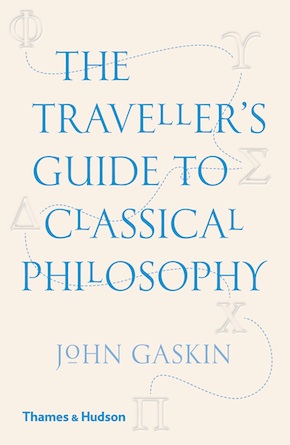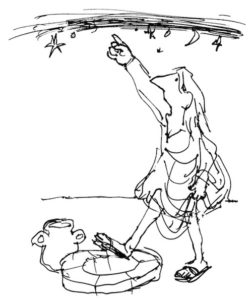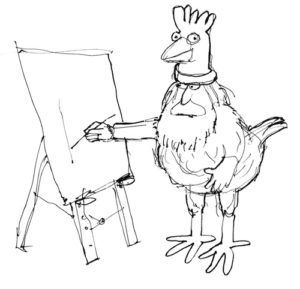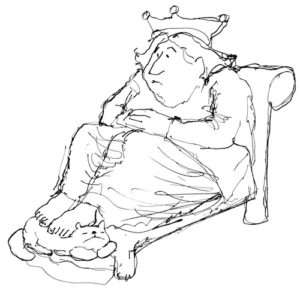Don’t hurry over them
by Mika Provata-CarloneJohn Gaskin (he likes to write his first name with a soupçon of Hellenic omega in its spelling) is a rather extraordinary man. A banker quickly turned philosopher and academic, he has been lecturing and writing prolifically on almost all things ancient for more than half a century. Revered for his scholarship and mellifluous paeans about the ancient world, and its pursuit of the good or at least the cogent life, he has been as appreciated for his connoisseurship on wine, fine food and travelling, and especially for seeing the true image behind the disappearing mirage. He has described his own trajectory through life in characteristically phlegmatic, unblushingly pithy terms: “At the age of sixteen, I read On the Nature of Things, the great Epicurean poem by Lucretius. More than anything else in my life this work provoked the doubts and thoughts which eventually made me a philosopher and which have always led me to seek a full and joyful life. My earlier recreations were rowing, riding, climbing, travel, antiquarianism, and of course sex. In middle and old age they have tended toward walking, gardening, writing, and antiquarianism. I am by inclination a countryman and writer of stories, by profession a philosopher, and by necessity, on occasions, a dweller in great cities… Since partial retirement in 1998, I have travelled with delight in ancient lands, drunk finer wines, and written with more imagination.”
His latest book (and there are several more forthcoming) is a distillation of both his years as a teacher of ancient Greek thought and of his experiences as a travelling companion or guide to groups of willing or unwitting initiates to the mysteries of ancient places and their stories. Serious and jocular in turns, The Traveller’s Guide to Classical Philosophy seeks to ensure “that the founding ideas of our civilisation should be better known; that they should inspire the interest they deserve; and that their relevance to us now should be seen anew.” Reader, thou hast been forewarned…
There is something irresistible about a book that claims to be not a but the traveller’s vade mecum, illustrated to boot, to ancient philosophy, even, or especially when it comes with the ‘caveat lector’ that it means serious business – that of provoking some genuine thinking both about globetrotting and about our relationship with our mind’s power to explore, conceive of, and explain the world and what, if anything, lies beyond it. ‘Wander and wonder’ would be a good way to summarise Gaskin’s principle and desired goal, and even armchair pilgrims and peregrinating vagrants will find much to be enchanted by in this sumptuously rich survey of and odyssey through ancient thought and occasional modern thoughtlessness.
Gaskin believes not only in rational analysis but also in a certain historical and cultural empathy and feeling – distinctive qualities that set this slim yet pregnant volume apart from similar endeavours.”
Gaskin likes to begin at the beginning, and Homer, in his view, is where it all starts: “the first two chapters, on Troy and Homer, are in a narrow sense not on philosophers at all, you will say. But in them is the background to all that is thought and felt later.” Interestingly for a philosopher, Gaskin believes not only in rational analysis but also in a certain historical and cultural empathy and feeling – distinctive qualities that may well set this slim yet pregnant volume apart from similar or parallel endeavours. He will begin with the world described by Homer (refreshingly, he summarily dismisses all theories of multiple bards or of no bard on the basis of what the ancients themselves believed and on strict and solid common sense), and then chart the development of “the idea of Hellenism [or] what the Greeks created” through the Milesians, the Presocratics, Plato, Socrates and Aristotle, the Hellenistic philosophers and their reception by Roman thinkers and rhetoricians, all the way through “the transformation of Classicism into Byzantine Christianity in the 4th century AD.”
His succinct, yet engrossingly insightful outline of ancient and Hellenistic antiquity and early Byzantine Christianity provides a vital mind map for both ideas and their setting, anchoring individual figures and philosophical landmarks within a broader framework of understanding. Even if we might vaguely associate Aristotle with Alexander’s post-Athenian golden age, we often forget that Homer and Hesiod are in many ways the precursors of Presocratic thought, or that Plato’s writings evolved in a vital relationship with the experience and the aftermaths of the Peloponnesian War, that Hadrian and Marcus Aurelius, those unique, extraordinary emperor-philosophers or philosopher-kings were themselves the creators and the fruit of that rare (almost unprecedented) ‘century of peace’ between 96 and 180 AD.
Excitingly, humorously, with featherlight erudition and gravitas, Gaskin guides, beguiles and cajoles the simple, the eager, and the ‘Personalities’ in pursuit of easy lustre, towards a truer ideal. You will know, by the end of your reading, why “when you’ve seen one ruin you have seen them all”, since “these structures result from the political and cultural activities that constituted being Greek” – the utterly fascinating, for Gaskin, “idea of Hellenism”. More than a historical category, it is a cultural value and civilising principle that emerged once the notional and philosophical transcendence was made between what was initially a racial, tribal, national identification, and an understanding of humanity and civilisation as a culture of what Werner Jaeger famously called paideia. Without losing its Greek specificity or its Hellenic transubstantiation, the idea of Hellenism became an ecumenical topos, trope and mode of existence, a perception even of the very notion of being human, of acting as one, of being worthy of being defined as such.
Gaskin offers us a blueprint of such a culture of ethics and learning, of civic and spiritual understanding, with almost Lego-chart precision. It is that simple, he seems to be saying, for humanity has a natural proclivity towards the good and the beautiful, if only…
His Traveller’s Guide is a heartfelt eulogy of what was and might have been, an unflinching anatomy of our failures, inadequacies, perverted and perturbed solutions and abortive resolutions to our own time’s political, cultural, ultimately philosophical and spiritual crisis. The Hellenes in Gaskin’s hands emerge as vibrant and lifelike as if they were people one had met upon one’s journey on a hot summer’s day (winter does not seem to feature greatly in the writings of ancient authors, apparently). Each separate section of this book evinces both a quickfire and a gem-like quality. Whether he is sweeping across two or more millennia of history or offering precise analyses of Homer’s poems and their ethics, of ancient theatre and its functions, or of the practical habits and natural environments of philosophical disputations, the resulting narrative is perfectly ancient and utterly modern all at once. His contrastive account of the differences between Greek and Roman versions is equally absorbing, whether he discusses philosophy (Roman philosophers had to cater to the practical needs of the rich and powerful, and could not unduly ruffle feathers) or civic institutions such as the theatre, which inevitably changed from being the space of public paideia or the venue of democracy and civic justice (Socrates’ trial was conducted in a theatre), to becoming the training ground, no longer of a citizen body, but of a politically usable, malleable vulgus. Whether the question is individual will, fatality and fortune or the will of the gods, Gaskin provides a navigator’s chart through each, clarifying distinctions, evolutionary elaborations, and the dramatic shift from Greece to Rome.
Through history, literature and anecdote, Gaskin conjures up men, especially philosophising, thinking men, with a keen sense of politics, historical determinism, micro- and macro-economic savvy, a fascination for ethics, art, and hard science (of a sort), and especially a wondrous sense of delight for the fact of life itself. From the earliest thinkers to the later professional intellectuals, the Greek philosophers are presented to us as the harbingers of a state of being which for all its faults can still allure us as much for its rock-solid tangibility and welcome familiarity, as it does for its distinct Arcadian, if not Phaeacian qualities. Whether we choose the blessed bucolic life (now impossible), or that equally beatific island forever doomed to be cut off from the rest of the world (equally non-existent), or our own humble, troubled, inadequate yet cherished Ithacas, we cannot remain unchanged and unmarked by any contact, however vicarious, with the Hellenic world.
“It is not the amassing of information or of the facts of observation that is crucial, but the pure, earnest effort towards critical understanding and true meaningfulness that renders us fully human.”
This is especially true now, when the modern tendency seems to be towards the Babylonian rather than the Hellenic paradigm, namely towards the accumulation of Big Data, rather than what Gaskin perceives as the fundamental triumph of the Greeks: “to think the question is the colossal achievement”, to conceive of the fact that it should even be asked. In his exposition of both the metaphysical and the ‘physical’ (scientific) progression of questions thus formulated by the Greeks, Gaskin pinpoints clearly why it all matters: it is not the amassing of information or of the facts of observation that is crucial, but the pure, earnest effort towards critical understanding and true meaningfulness that renders us fully human.
Gaskin presents the motley assortment of theories that make up Greek philosophy vividly and very temptingly. So much so, that his readers may find themselves hard pressed to choose one over another – some may even wish to espouse them all. He is an astute reader and an energetic summariser, combining the ‘garrulous’ cameos of Diogenes Laertius with meticulous closer readings of the texts themselves. Once he has reached the Epicureans and the Stoics, Gaskin becomes an even more excited proponent of the wisdom he feels we have unwisely left behind. Arguing fervently for the merits of the school of thought that grew around the teachings of Zeno of Citium, under the colonnaded arcade that gave the movement its name, Gaskin tries to explain why we ourselves are no longer living under its premises and exalted light: it is “because Stoicism as a way of life was for the strong-minded, the thoughtful, the rigorous and the powerful. Christianity offered everything to the weak and the dispossessed, and demanded no thought and complex argument, but faith; and faith once granted can move mountains. Thought is always hard and, in the end, may have to acknowledge that mountains stay where they are.”
It is a sharply biased, ultimately dogmatic rather than argued assessment, and one does wonder why, yet such is perhaps both the charm and the shortcoming of Gaskin’s very personal engagement with the Hellenes and their minds, namely that it evinces both riveting pathos and a certain singlemindedness, a lack of Socratic dialectics. The Aristotelian origins of Christian theology, from Patristic scholarship to everyday ecclesiastic texts, somehow receive only a fleeting, hostile dismissal, an example of how Gaskin sometimes tends to overlook basic features and principles in order to almost force a point through, as in his discussion of sin and paganism, where he appears to ignore the fundamental concept of hubris in the ancient world. In his analysis throughout, Islam and Christianity invariably get paired as historical agents and culprits, with a startling omission of Judaism from almost all discussions – again, he seems to be particularly doubtful of what Robert Fagles once termed the shared Helleno-Judaeo-Christian tradition of our world.
Ancient philosophy is above all a story – a vast array of storylines and almost literary plots about who we are, what the world is, how we came to invent and tell stories at all – and from that perspective, as well as from many more, Gaskin’s version of that story is quite a marvellous one. Read more and further afield to add to it, to argue mirthfully with or against it, and especially, as Gaskin himself advises, do not rush through it. Make the journey long and careful, shrewd and cherished, and in this Gaskin is certainly a boon companion and interlocutor, a fine, if pugnacious gadfly.
John Gaskin, formerly professor of Naturalistic Philosophy at Trinity College Dublin, frequently lectures on cruises to the classical sites of the Aegean. The Traveller’s Guide to Classical Philosophy, with pen drawings by John Kaine, is published by Thames and Hudson.
Read more
@thamesandhudson
Mika Provata-Carlone is an independent scholar, translator, editor and illustrator, and a contributing editor to Bookanista. She has a doctorate from Princeton University and lives and works in London.





